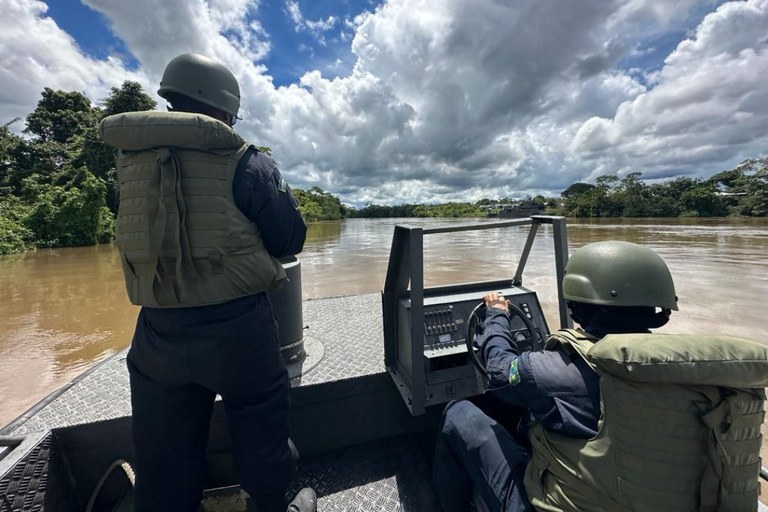Advanced cookie settings
To improve your experience on the platform and provide personalized services, we use cookies.
Notícias
INDIGENOUS PEOPLES

Credit: Brazilian Ministry of Defense
The Armed Forces are deploying 800 military personnel, supported by riverine, terrestrial, and aerial assets, to combat illegal mining activities within the Yanomami Indigenous Land situated in the states of Amazonas and Roraima. Additionally, four aircraft are designated for eviction operations. These endeavors mark the second phase of Operation Catrimani, under the supervision of the Ministry of Defense. Encompassing an area larger than Portugal, this region consists of dense forests, lacks infrastructure such as roads, and possesses only a limited number of navigable rivers during dry seasons. Despite these formidable obstacles, approximately 27 thousand indigenous people inhabit this area.
The Administrative Rule No. 1511/2024, delineating the operational guidelines of the Ministry of Defense, was officially published on Monday, April 8, 2024, in the Diário Oficial da União. Support activities involve the participation of the Army, Navy, and Air Force. In March, the Federal Government issued a provisional presidential decree (MP), allocating an extraordinary credit of 1 billion Brazilian reais (USD 199 million) to fulfill the operational plan. This decree specifies the allocation of resources among eight ministries, with the Ministry of Defense receiving 309.8 million Brazilian reais (USD 61.6 million). These funds are designated for the deployment of the Armed Forces and the Management and Operational Center of the Amazon Protection System (Censipam).
CATRIMANI - The initial phase of Operation Catrimani was primarily focused on the distribution of emergency food aid, overseen by the Joint Operational Command Catrimani, which was operational from January 17 to March 31, 2024. Throughout this period, a total of 374 military personnel from the Navy, Army, and Brazilian Air Force collaborated to provide crucial logistical support for the delivery of humanitarian aid to communities residing within the Yanomami Indigenous Land (TI). A fleet consisting of over 36 aircraft was mobilized for this specific purpose. The distribution of cestas básicas (food assistance packages) was successfully concluded on March 26, 2024, in Boa Vista, the capital of the state of Roraima. This extensive and intricate operation involved 2,400 flight hours and culminated in the delivery of 360 tons of essential supplies to 236 communities located within the Yanomami Indigenous Land.
TASK FORCE - Since January 2023, the Ministry of Defense has played a pivotal role within the Federal Government's task force aimed at safeguarding the Yanomami. Through collaborative efforts across ministries over the past year, the Armed Forces have transported over 760 tons of supplies and three thousand patients via air for specialized medical care, apprehended 165 garimpeiros (illegal miners), and distributed 36 thousand food assistance packages. These multifaceted endeavors engaged 1,500 military personnel and utilized 18 aircraft variants from the Navy, Army, and Air Force, accumulating over 7,400 flight hours. This translates to a distance exceeding 1.6 million kilometers (994 miles), equivalent to traversing the Earth's circumference more than 40 times.
GOVERNMENT HOUSE — On February 29, 2024, the Federal Government inaugurated the Government House in Boa Vista, located in the state of Roraima, with the aim of centralizing the activities of the 31 federal agencies operating within the Yanomami Indigenous Land. This initiative, having completed its first month of operation on March 29, 2024, marked a significant achievement: a reduction of 94.86% in newly degraded areas attributed to illegal mining. In March of the current year, only 2.16 new hectares (equivalent to 5.33 acres) were degraded, compared to 42.59 new hectares (105.24 acres) in March 2023, representing a remarkable decline of 94.86%. The extent of newly opened mining areas in 2022 was even higher, reaching 50.02 hectares (equivalent to 123.6 acres).
HEALTH — The Ministry of Health has designated the Yanomami Territory as the pioneering site in Brasil to implement innovative malaria treatment, a disease that continues to have a significant impact on public health. Tafenoquine, a new drug, has been integrated into the Unified Health System (SUS) and is administered in a single dose, simplifying treatment adherence compared to the previously used medication, which required a 14-day administration period. To address the healthcare needs of the Yanomami population, the Ministry of Health has allocated 8,000 doses of the new medication to the territory. Furthermore, within the healthcare sector, over 350 appointments were conducted at the Indigenous Health Support House (Casa de Saúde Indígena - CASAI) in Boa Vista in March 2024. The comprehensive plan includes the establishment of a Hospital Back-up Unit for Indigenous Peoples (URHPI) in Boa Vista, the construction and renovation of 22 basic indigenous health units in the Yanomami Territory, and the development of a permanent facility for the reference center in the Surucucu region.
FUNAI — The Ministry of Management and Innovation (Ministério da Gestão e da Inovação em Serviços Públicos - MGI) has initiated a focused recruitment process to expand the National Foundation of Indigenous Peoples (Fundação Nacional do Povos Indígenas - FUNAI) team by adding 33 new employees dedicated to serving the Yanomami community. Dialogue with leadership within the Ministry of Indigenous Peoples (Ministério dos Povos Indígenas - MPI) has been intensified, as evidenced by the organization of the "Week of Dialogue and Monitoring of Actions in the Yanomami Indigenous Land." This event, held from March 12-15, 2024, brought together eight representatives from Yanomami and Ye'kwana associations with Federal Government representatives in Brasília, with the goal of strengthening the action plan within the territory.
